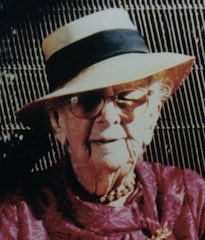Marjory Stoneman Douglas’s 1947 best seller, The Everglades: River of Grass, raised America’s consciousness and transformed the Florida Everglades from an area that was looked upon as a useless swamp – to be drained and developed commercially – to a national park that is seen as a valuable environmental resource to be protected and preserved. After this successful campaign to preserve the Everglades as a national park, Douglas continued her work by founding the Friends of the Everglades, a conservation organization still active today.
Always ahead of her time, Douglas graduated from Wellesley College as an English major in 1912. A few years later, Douglas went to Miami to be a reporter for her father’s newspaper, which later became The Miami Herald. During World War I, she served with the American Red Cross in Europe. After the war, she launched her career as a newspaper editor at her father’s paper. Many of her editorials focused on what she perceived to be Florida’s increasing problem of rapid commercial development. In the 1920s, she left the newspaper to launch a second career as an author. Over the years she published many books and short stories, both fiction and non-fiction – most for adults but several for children – especially focusing on women, the history and life in southern Florida and environmental issues. She also engaged in a number of other campaigns and charity work to improve society: campaigns against slum-lords and for improved housing conditions, for free milk for babies whose parents needed aid, and for the ratification of the Women’s Suffrage Amendment.
Most important, she dedicated her life to preserving and restoring the Everglades. She lived long enough to witness great successes. In 1996, for example, Florida voters passed a constitutional amendment that held polluters primarily responsible for cleaning up the Everglades. And the Florida and federal governments have authorized multimillion-dollar projects to restore and expand the Everglades. In recognition of her tireless and successful struggle, the state of Florida named the headquarters of its Department of Natural Resources after her.
Awarding Mrs. Douglas the Presidential Medal of Freedom in 1993, President Clinton recognized her achievements. Upon her death in 1998 at the age of 108, President Clinton said: “Long before there was an Earth Day, Mrs. Douglas was a passionate steward of our nation’s natural resources, and particularly her Florida Everglades.”

